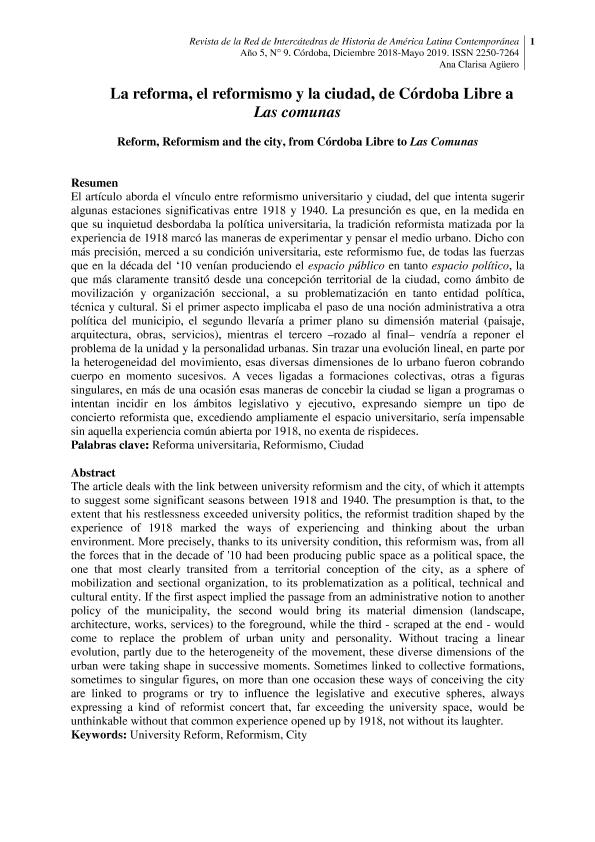Mostrar el registro sencillo del ítem
dc.contributor.author
Agüero, Ana Clarisa

dc.date.available
2019-10-29T19:03:56Z
dc.date.issued
2018-12-30
dc.identifier.citation
Agüero, Ana Clarisa; La reforma, el reformismo y la ciudad: de Córdoba Libre a Las comunas; Red de Intercátedras de Historia de América Latina Contemporánea; Revista de la Red de Intercátedras de Historia de América Latina Contemporánea; 9; 30-12-2018; 1-15
dc.identifier.issn
2250-7264
dc.identifier.uri
http://hdl.handle.net/11336/87579
dc.description.abstract
El artículo aborda el vínculo entre reformismo universitario y ciudad, del que intenta sugerir algunas estaciones significativas entre 1918 y 1940. La presunción es que, en la medida en que su inquietud desbordaba la política universitaria, la tradición reformista matizada por la experiencia de 1918 marcó las maneras de experimentar y pensar el medio urbano. Dicho con más precisión, merced a su condición universitaria, este reformismo fue, de todas las fuerzas que en la década del ‘10 venían produciendo el espacio público en tanto espacio político, la que más claramente transitó desde una concepción territorial de la ciudad, como ámbito de movilización y organización seccional, a su problematización en tanto entidad política, técnica y cultural. Si el primer aspecto implicaba el paso de una noción administrativa a otra política del municipio, el segundo llevaría a primer plano su dimensión material (paisaje, arquitectura, obras, servicios), mientras el tercero –rozado al final– vendría a reponer el problema de la unidad y la personalidad urbanas. Sin trazar una evolución lineal, en parte por la heterogeneidad del movimiento, esas diversas dimensiones de lo urbano fueron cobrando cuerpo en momento sucesivos. A veces ligadas a formaciones colectivas, otras a figuras singulares, en más de una ocasión esas maneras de concebir la ciudad se ligan a programas o intentan incidir en los ámbitos legislativo y ejecutivo, expresando siempre un tipo de concierto reformista que, excediendo ampliamente el espacio universitario, sería impensable sin aquella experiencia común abierta por 1918, no exenta de rispideces.
dc.description.abstract
The article deals with the link between university reformism and the city, of which it attempts to suggest some significant seasons between 1918 and 1940. The presumption is that, to the extent that his restlessness exceeded university politics, the reformist tradition shaped by the experience of 1918 marked the ways of experiencing and thinking about the urban environment. More precisely, thanks to its university condition, this reformism was, from all the forces that in the decade of '10 had been producing public space as a political space, the one that most clearly transited from a territorial conception of the city, as a sphere of mobilization and sectional organization, to its problematization as a political, technical and cultural entity. If the first aspect implied the passage from an administrative notion to another policy of the municipality, the second would bring its material dimension (landscape, architecture, works, services) to the foreground, while the third - scraped at the end - would come to replace the problem of urban unity and personality. Without tracing a linear evolution, partly due to the heterogeneity of the movement, these diverse dimensions of the urban were taking shape in successive moments. Sometimes linked to collective formations, sometimes to singular figures, on more than one occasion these ways of conceiving the city are linked to programs or try to influence the legislative and executive spheres, always expressing a kind of reformist concert that, far exceeding the university space, would be unthinkable without that common experience opened up by 1918, not without its laughter.
dc.format
application/pdf
dc.language.iso
spa
dc.publisher
Red de Intercátedras de Historia de América Latina Contemporánea
dc.rights
info:eu-repo/semantics/openAccess
dc.rights.uri
https://creativecommons.org/licenses/by-nc-nd/2.5/ar/
dc.subject
Reforma universitaria
dc.subject
Reformismo
dc.subject
Ciudad
dc.subject
Córdoba
dc.subject.classification
Otras Historia y Arqueología

dc.subject.classification
Historia y Arqueología

dc.subject.classification
HUMANIDADES

dc.title
La reforma, el reformismo y la ciudad: de Córdoba Libre a Las comunas
dc.title
Reform, Reformism and the city: from Córdoba Libre to Las Comunas
dc.type
info:eu-repo/semantics/article
dc.type
info:ar-repo/semantics/artículo
dc.type
info:eu-repo/semantics/publishedVersion
dc.date.updated
2019-10-23T21:44:19Z
dc.journal.number
9
dc.journal.pagination
1-15
dc.journal.pais
Argentina

dc.journal.ciudad
Córdoba
dc.description.fil
Fil: Agüero, Ana Clarisa. Consejo Nacional de Investigaciones Científicas y Técnicas. Centro Científico Tecnológico Conicet - Córdoba. Instituto de Antropología de Córdoba. Universidad Nacional de Córdoba. Facultad de Filosofía y Humanidades. Instituto de Antropología de Córdoba; Argentina
dc.journal.title
Revista de la Red de Intercátedras de Historia de América Latina Contemporánea
dc.relation.alternativeid
info:eu-repo/semantics/altIdentifier/url/https://revistas.unc.edu.ar/index.php/RIHALC/article/view/22111
Archivos asociados
